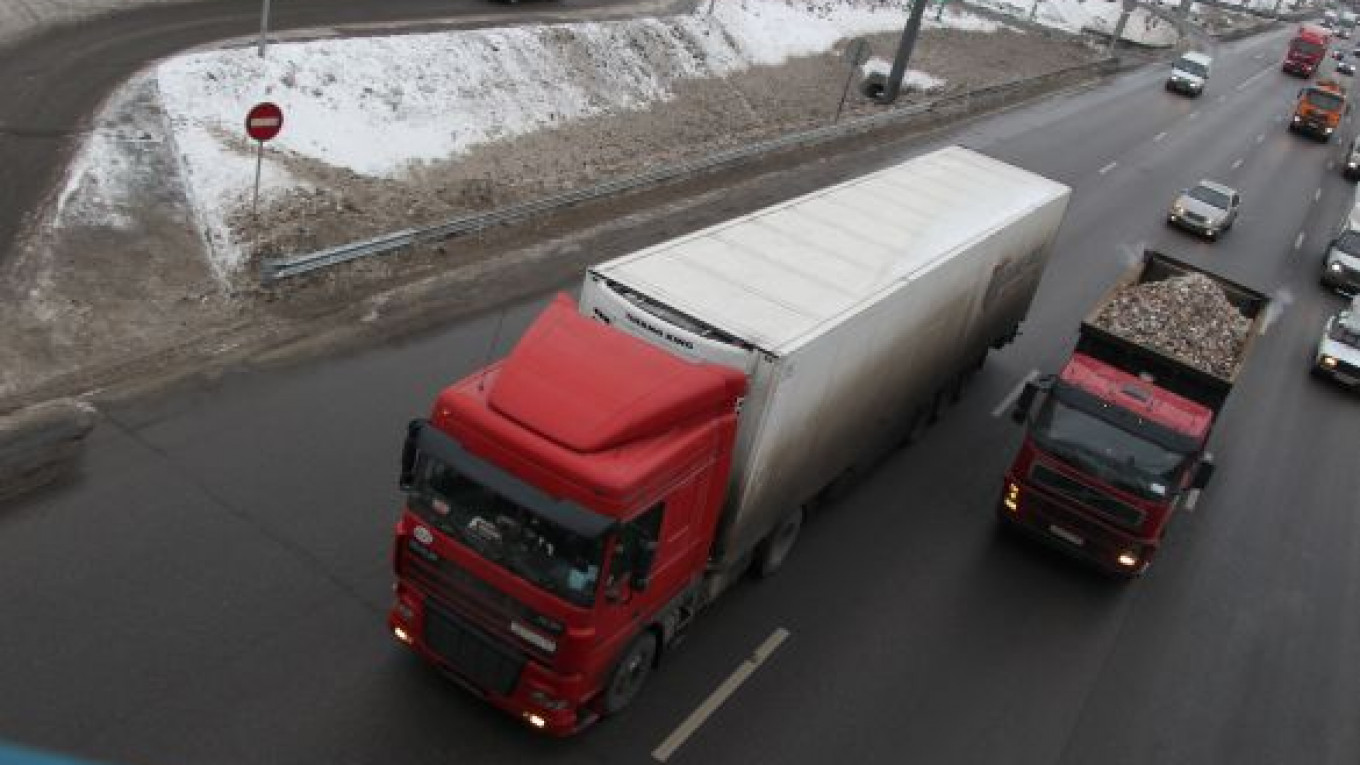Moscow city authorities are imposing harsher restrictions on heavy-duty trucks that enter the capital starting from May 1 while raising the fines for violators.
All trucks with a capacity of up to 12 tons will be banned from entering the Moscow Ring Road, or MKAD, from 6 a.m. to 10 p.m.
Under the previous rules, introduced on March 1, only heavy-duty trucks that transit through Moscow to another location could not enter the MKAD.
As before, trucks with a capacity of more than a ton are not allowed inside the Third Ring Road, located between the MKAD and the Garden Ring, during the day. Trucks that do not meet Euro 2 or higher emission standards are not allowed to enter the Third Ring Road at any time.
The fines for not following these rules will be increased. From May 1, they will be raised from the current 500 rubles ($16) to 2,000 rubles and are expected to go up higher in the upcoming months. The fine will rise to 3,000 rubles in June and 5,000 rubles in July.
Violators are recorded by cameras installed along the whole length of the MKAD and caught by the police on patrol. As of now, the police issue from 5,000 to 10,000 fines a day, said Dmitry Savchenko, a deputy head of Moscow's Transportation Department.
But there are exceptions to the ban to enter the MKAD. Trucks that carry goods necessary to satisfy the needs of the capital or those transiting through Moscow to the Moscow region can get a legal free pass. Almost 12,000 passes have already been issued by the authorities of both regions, Savchenko said.
"Although we have warned truckers of the upcoming restrictions well in advance, the number of applications for the passes has gone up significantly only over the last few weeks," Savchenko said. To handle the lines waiting for passes, the authorities even had to hire new personnel and make them work in shifts to ensure a 24 hour service, he added.
The goal behind all the restrictions is to ease the burden on the congested MKAD, which produces the longest traffic jams in Europe during rush hour, with some of them stretching for as far as 30 kilometers.
According to the Moscow transportation department, transit accounted for more than 40 percent of heavy-duty trucks on the Moscow Ring Road before the restrictions were introduced, and a third of these truckers chose to travel during the day.
Since the restrictions were introduced on March 1, the number of transit vehicles on the MKAD in the daytime has decreased more than 30 percent, while nighttime transit traffic has almost doubled.
While the measures may have led to some improvements, the Yandex Probki traffic jam monitoring service does not show an overall decrease in traffic on the MKAD.
According to a Yandex Probki report for March, the situation did improve in the middle of the day but stayed almost unchanged during rush hours. At the same time the traffic went from bad to worse on the Moscow region's A107 and A108 ring roads, which bypass the capital.
Contact the author at a.panin@imedia.ru
A Message from The Moscow Times:
Dear readers,
We are facing unprecedented challenges. Russia's Prosecutor General's Office has designated The Moscow Times as an "undesirable" organization, criminalizing our work and putting our staff at risk of prosecution. This follows our earlier unjust labeling as a "foreign agent."
These actions are direct attempts to silence independent journalism in Russia. The authorities claim our work "discredits the decisions of the Russian leadership." We see things differently: we strive to provide accurate, unbiased reporting on Russia.
We, the journalists of The Moscow Times, refuse to be silenced. But to continue our work, we need your help.
Your support, no matter how small, makes a world of difference. If you can, please support us monthly starting from just $2. It's quick to set up, and every contribution makes a significant impact.
By supporting The Moscow Times, you're defending open, independent journalism in the face of repression. Thank you for standing with us.
Remind me later.






